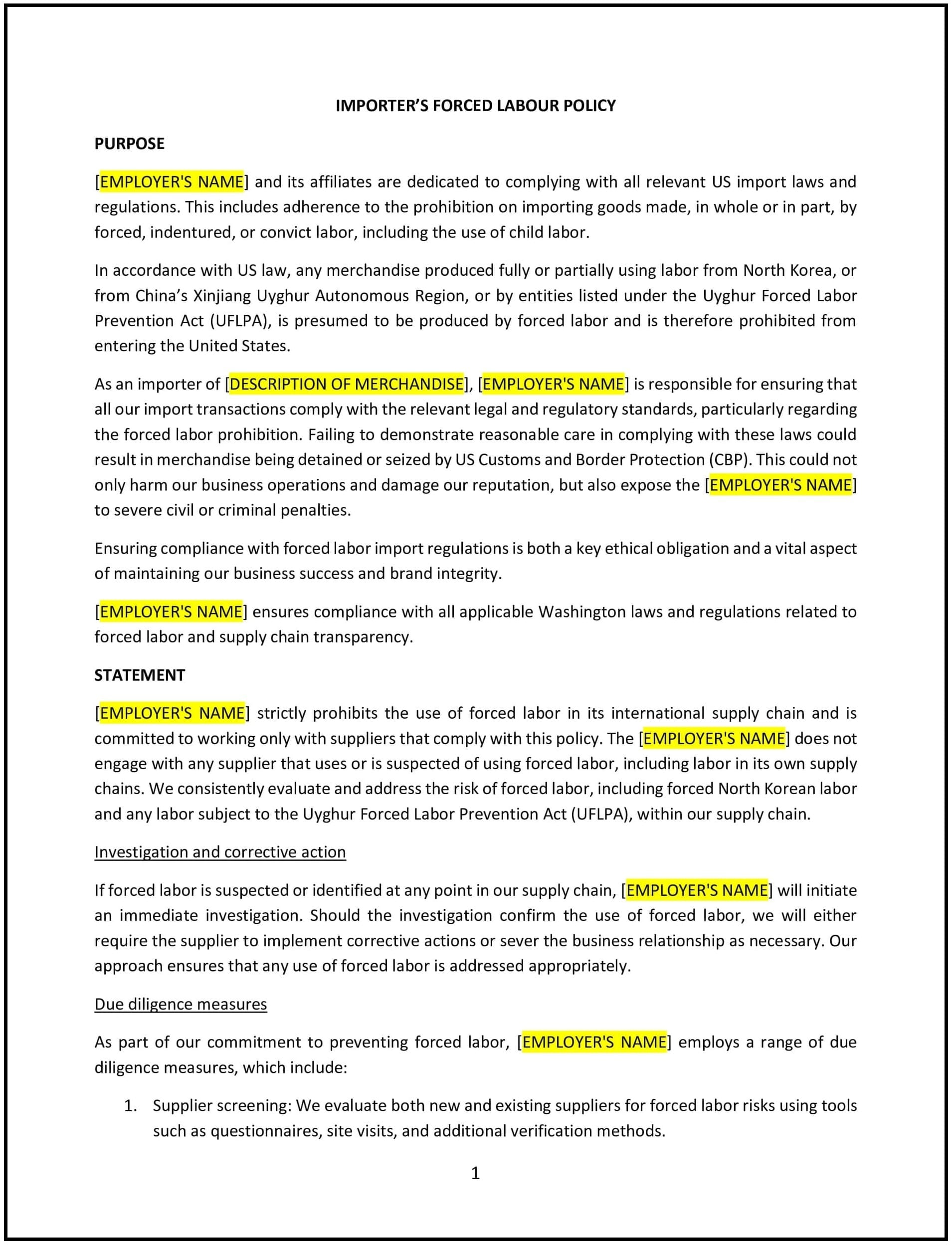Importer's forced labor policy (Washington): Free template
Got contracts to review? While you're here for policies, let Cobrief make contract review effortless—start your free review now.

Customize this template for free
This importer’s forced labor policy is designed to help Washington businesses ensure that their supply chains do not involve the use of forced or compulsory labor. The policy outlines the company’s commitment to ethical sourcing practices, compliance with federal and state laws, and efforts to prevent human trafficking and modern slavery in their supply chains. It provides guidelines for assessing suppliers, reporting concerns, and taking corrective actions when forced labor is identified.
By adopting this policy, businesses can demonstrate their commitment to human rights, enhance corporate social responsibility, and mitigate the risks associated with human trafficking and forced labor in the supply chain.
How to use this importer's forced labor policy (Washington)
- Define forced labor and human trafficking: The policy should clearly define forced labor, including any work or services that are exacted from individuals under threat or coercion. Include definitions of human trafficking and modern slavery to ensure comprehensive understanding.
- Assess supplier compliance: Establish procedures for assessing suppliers and vendors to ensure they comply with the company’s forced labor policy. This may include conducting regular audits, reviewing supply chain practices, and requiring suppliers to sign agreements that commit to ethical labor practices.
- Establish reporting mechanisms: Provide employees, suppliers, and stakeholders with clear instructions on how to report suspected forced labor, human trafficking, or other unethical practices in the supply chain. Ensure that reports can be made anonymously and without fear of retaliation.
- Set corrective actions: Outline the steps the company will take if forced labor or human trafficking is discovered within its supply chain. These actions may include terminating relationships with non-compliant suppliers, reporting the issue to relevant authorities, and offering remediation to affected individuals.
- Conduct training and awareness programs: Implement training for employees and suppliers on the identification and prevention of forced labor and human trafficking. This training should be regularly updated to reflect the latest legal requirements and best practices in ethical sourcing.
- Ensure compliance with Washington and federal laws: The policy should align with Washington state laws and federal regulations, such as the Trafficking Victims Protection Act (TVPA), the California Transparency in Supply Chains Act, and the UK Modern Slavery Act (for international supply chains).
- Review and update regularly: Periodically review and update the policy to ensure it remains compliant with changes in laws, regulations, and industry best practices. Regular updates will help ensure the policy stays relevant and effective.
Benefits of using this importer's forced labor policy (Washington)
This policy offers several benefits for Washington businesses:
- Promotes ethical business practices: By establishing clear guidelines and accountability for forced labor prevention, the policy helps businesses maintain ethical sourcing practices and uphold human rights.
- Enhances reputation and trust: A commitment to eliminating forced labor from the supply chain enhances the company’s reputation with customers, suppliers, and investors who value corporate social responsibility and human rights.
- Reduces legal and financial risks: By complying with forced labor and human trafficking laws, businesses can reduce the risk of legal penalties, fines, or damage to their reputation due to involvement in unethical supply chain practices.
- Increases supplier transparency: The policy encourages suppliers to operate more transparently, improving the integrity and traceability of the supply chain. This can lead to stronger, more accountable supplier relationships.
- Supports employee morale: Employees will be more likely to work for a company that demonstrates a clear commitment to human rights and ethical practices, which can lead to increased job satisfaction and retention.
- Contributes to social responsibility: The policy reflects the company’s broader social responsibility goals, contributing to the global effort to combat modern slavery and human trafficking in supply chains.
Tips for using this importer's forced labor policy (Washington)
- Communicate the policy clearly: Ensure all employees and suppliers are aware of the company’s commitment to preventing forced labor and human trafficking. Include the policy in the employee handbook, supplier contracts, and during onboarding for new employees and vendors.
- Monitor supply chains: Regularly assess and audit your supply chain to ensure compliance with the policy. This can involve requiring suppliers to submit compliance reports or participate in audits to verify their adherence to ethical labor practices.
- Train employees and suppliers: Provide training for both employees and suppliers on how to recognize signs of forced labor or human trafficking in supply chains. This training should emphasize the importance of reporting suspected issues.
- Encourage transparency: Work with suppliers to enhance transparency in the supply chain, including disclosing their suppliers and subcontractors. This ensures that forced labor risks are minimized at every stage of production.
- Review and update regularly: Periodically review the policy to ensure it remains compliant with Washington state laws, federal regulations, and any changes in the company’s operations. Regular updates will help keep the policy effective and relevant.